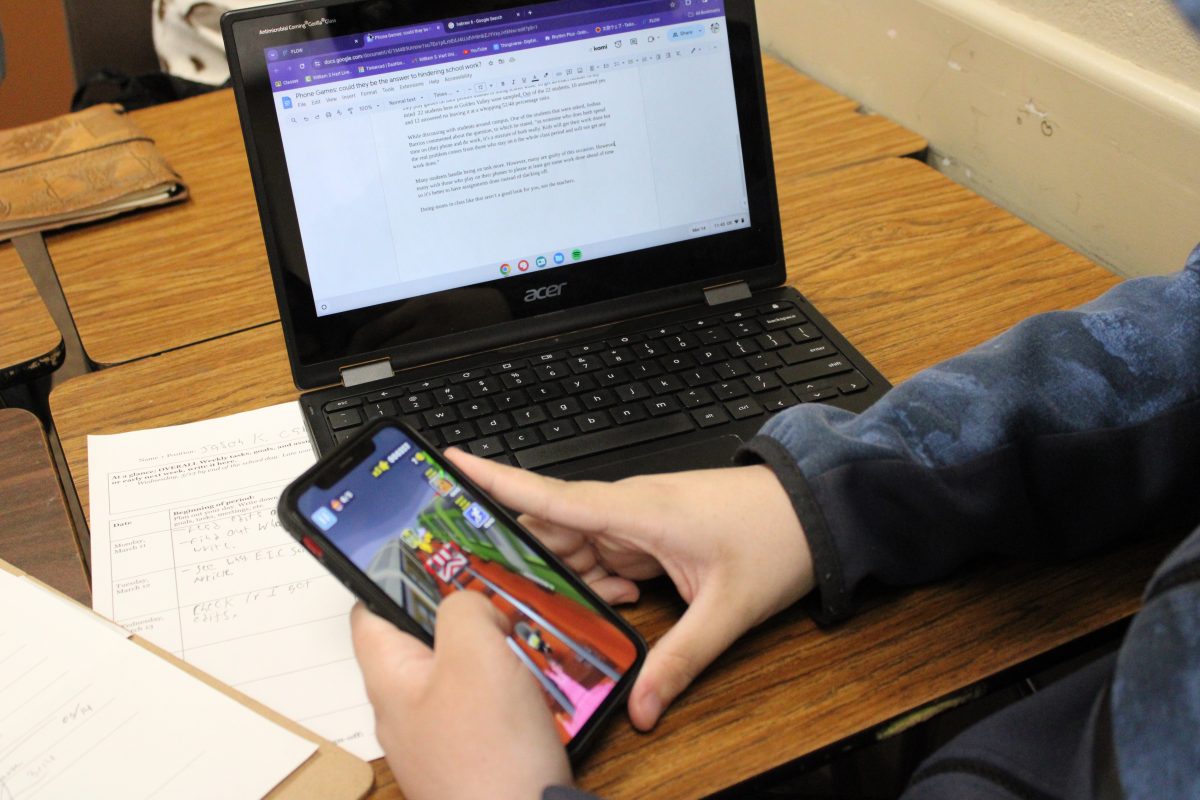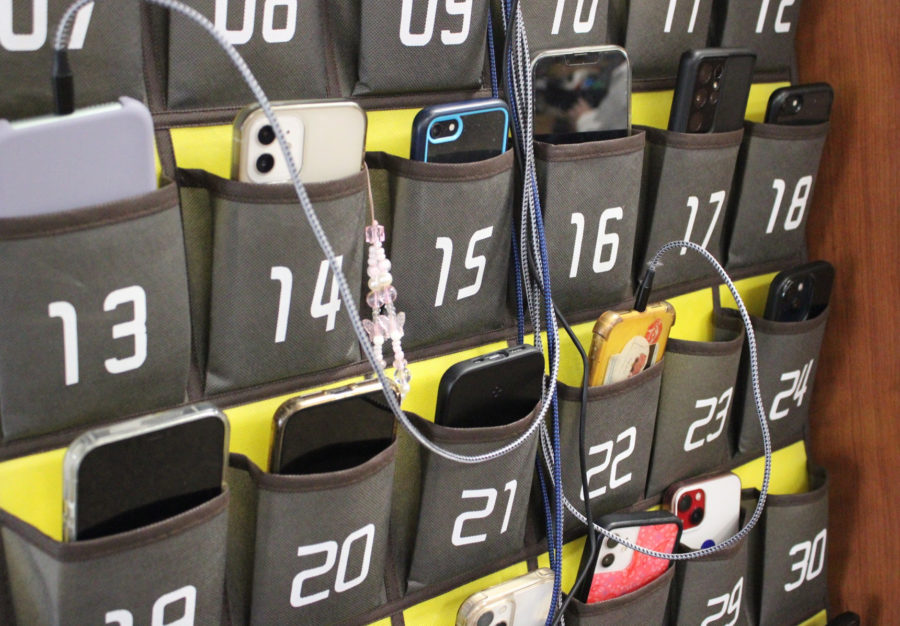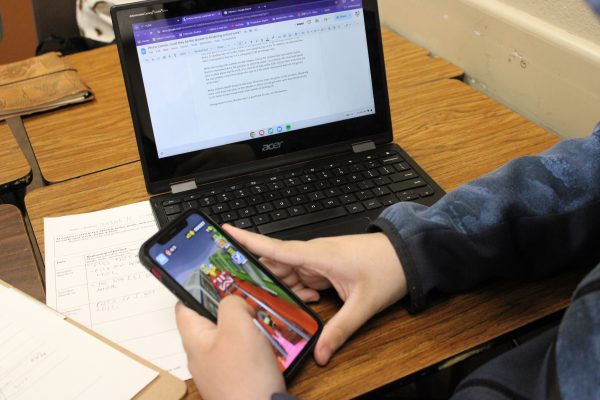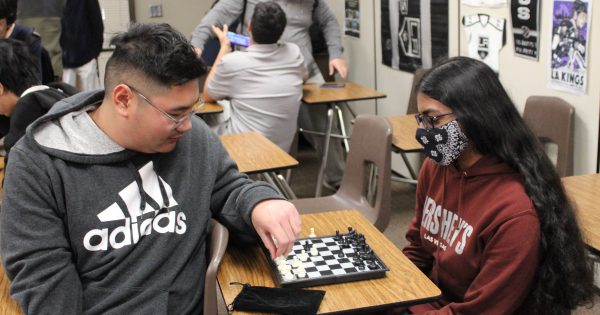Cell Phones in the Classroom: Changing classroom policies as teachers take action
Students phones stored away in Mr. Pateys Classroom.
Gradual Process
In 1992, touchscreen phones took the U.S. by surprise, but that was only the beginning of the massive intrusion of this technology. Cell phones can have many benefits, especially when getting in touch with friends and family. Even though these advancements are helpful, do smartphones break the dynamic of the academic structure of a classroom?
In the past, magazines were seen as what was going to be the “fall of the generation,” and now this generation has taken more advancements, and with this new technology, it is said to be the fall of this generation.
Kristin Yates states, “There is no way that a teacher can compete with an electronic device. Our job as teachers are to educate, and cell phones or even laptops, if used incorrectly, are designed to hold attention with the algorithms tech companies come up with to keep you engaged.”
Teachers Taking Action
Cell phones have been a major issue in the classroom, and now Golden Valley teachers are taking charge and creating policies for students to leave their phones at the front of the door, or in front of their classrooms.
Joshua Stimac an economics teacher, has a phone caddy and states, “I feel as though if students can’t actually see the phone, they kind of put it out of their mind, so I have it attached to the back behind my whiteboard when students come in they put their phone in there; it’s how I take the roll.”
Some teachers have been more lenient with the phones and have had students put their phones away at certain times of the day. Holly Ingersoll mentioned, “When I ban them, they are in a numbered box.” Many teachers mainly put phones away during testing instead of all of the class time.
Damage of phones
One thing that has been repeated over student interviews and teacher interviews is that phones can be addictive stimulants.
Nicholas Patey adds, “I’ve tried to take the perspective of helping students learn how to be in self-control of their phones because I saw them becoming a problem, and I try to educate students on the dangers of the phones being a distraction because something that would make them want to look at their phone whether it’s boredom or maybe the desire of wanting to see how a post is doing, just random things and if those things can take you away from your responsibilities I would say that’s an addiction and that’s a problem.”
There is no way that a teacher can compete with an electronic device. Our job as teachers are to educate, and cell phones or even laptops, if used incorrectly, are designed to hold attention with the algorithms tech companies come up with to keep you engaged.
— Kristin Yates, Teacher
Students aren’t the only ones using phones; teachers may also struggle with keeping them out of sight. When asked how often she checks her phone, the digital arts teacher, Janel Richardson replied, “All the time but I didn’t realize until I put the phone in the box with the kids.” With her thoughtfulness, she included herself in the policy for the class.
Student Response
Not many students are a fan of the policies put in action at the beginning of class to take phones away.
Senior Student Bianca Ruiz claims, “I don’t see changes when I don’t have my phone because there are multiple different ways I can get distracted without it. I don’t think taking my phone would really fix the issue or help me improve in class. It probably does help some students, but I wouldn’t say all.” Many students have found other ways to find distractions when it comes to being in the classroom; it’s not just the phone. Although phones have become a major distraction, it isn’t the only one.
Many students have reported feeling under-stimulated in the classroom due to the way the teachers interact with students. A senior student Edhel Erual, “With Mr. Gaunt, being in his class is really interesting because he doesn’t enforce the cell phone policy because of the way he engages students and facilitates good conversations. I barely see anyone actually pick up their phones, and if they do, it’s usually because they’re checking the time or doing something really minor.”
When teachers are able to captivate the attention of students, they are able to put phones out of their mind and focus on engaging in the classroom.
Should They be Banned?
If phones were banned even for teachers and students, it may be the most effective. On the flip side, the lack of engagement can be a major problem, especially for students. Whether it be phones or other side distractions, students aren’t as focused if teachers are not stimulating them more academically.

Hannah Monet Medellin is a twelfth grade student at Golden Valley High School. She is active in her school by being a staff writer for the new Grizzly Gazette, and a peer counselor at the GROWL center. She began peer counseling in the eleventh grade and has worked her way to the honors peer counseling. Hannah is an avid reader and plant owner. For most of her life she found herself lost in the thoughts of others that shared it through ink on a paper. When she was fourteen she began to fall back into her love for plants and has plans to have her own greenhouse someday.
She has always had a love for reading and writing and can’t wait to participate in reading everyone's articles and sharing her own. Showing the creativity of others is her goal. If there is any short story, poems or art that wants to be submitted she’d love to share it in her articles!

Andrew Osmond is currently a senior at Golden Valley High School. He is a staff photographer for The Grizzly Gazette and previously wrote for the sports section of the newspaper. Andrew has been involved in the Golden Valley choir for two years. Some of his hobbies include playing the guitar, singing, cardistry, and magic. He hopes to go to college after high school and find a job that will suit him well.
When writing he is most passionate about covering local stories and groundbreaking issues in the world. What being a student journalist means to Andrew is expressing creativity and informing people of good information.














































